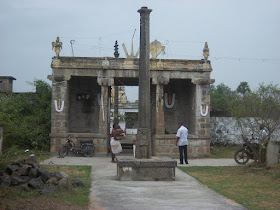Adikesava Perumal Temple, Vallipuram, Kanchipuram
Adikesava
Perumal Temple is dedicated to Hindu God Vishnu located at Vallipuram, a small
village approximately 15 kms from Chengalpattu town in Kanchipuram district of
Tamilnadu. This entire region, consisting of Chengalpattu, North Arcot and
South Arcot districts of Tamil Nadu formed part of the ancient territorial
region known as Thondaimandalam. The river Palar which flowed through the heart
of this region contributed to the prosperity of many settlements in this area,
including Kanchipuram, the ancient Pallava capital.
The
Pallava and Chola rulers constructed many temples in the villages and towns of
this area with the Vijayanagara dynasty also subsequently contributing to the architectural
development of the temples already existing there. The village of Vallipuram,
situated close to the Palar, on its northern bank, might have been a
Chaturvedimangalam, or a village of scholars learned in the four Vedas, like
many others in the nearby areas.
According
to the Manasara, an ancient text in Sanskrit on civil engineering, a village
should have a Siva temple on the north-east, a Vishnu temple on the south-west
with a tank on true west. The village of Vallipuram has such an arrangement,
conforming to the rules laid down in this treatise.
The
Temple
The
temple, as well as the central sanctum-sanctorum, faces east. The main stone
image of Sri Adikesava Perumal, enshrined here is in a standing posture,
wearing a Salagrama garland, holding the conch and discus in his upper left and
right hands respectively. His lower right hand is in abhaya hasta and lower
left hand is in kati hasta, resting near his hip. His consorts, Sri Devi and
Bhu Devi are seen on either side. All the three images are seen on the same
pedestal. It is interesting to note that unlike most temples, there is enough
space between moola-Vigrahas and the rear wall for a person to circumambulate
these images.
The
bronze processional image is also worshipped by the name Sri Adikesava Perumal
and has the conch and discus in his upper hands and the lower hands are in
abhaya hasta and kati hasta just like the main image. He too wears a Salagrama
garland. The beauty of the images, both the achala-bhera and the chala-bhera,
are truly captivating. On observing closely, one can even see the beautiful
long and pointed tips of the nails of the Utsava-vigraha. The other bronze
images which are kept here are Chakrattazhvar, Andal and the Snapana Bhera.
This
temple is a beautiful specimen of Chola architecture, consisting of a
garbha-griha, the antarala (passage between the garbha-griha and the mandapam),
the maha-mandapam and the agra-mandapam. In the antarala, the bronze image of
Sri Bhakta Anjaneya can be worshipped, along with the icons of Vishvaksena,
Nammazhwar and the great Srivaishanva Acharya, Sri Vedanta Desika. The mandapam
in front houses the processional image of Ambujavalli Thayar, the consort of
Adikesava Perumal as also the stone images of all the Azhwars.
The
image of the Bhudattazhwar with his right hand in jnana-mudra resting on this
chest is very reminiscent of a similar one worshipped at Mamallapuram, his
birthplace, not too far from Vallipuram. Above the central sanctum is the
vimana in typical Dravidian style of architecture belonging to the Chola epoch.
It contains beautiful stucco figures of Lord Vishnu in various forms like Sri
Adikesava, Varaha, Venugopala, Lakshmi-Narayana, Krishna, Lakshmi Narasimha and
Sita-Lakshmana-Hanumath Sametha Sri Kodandarama.
The
shrine for Ambujavalli Thayar, enshrining the stone image of this Goddess, is
located in the circumambulatory passage, to the right of the main sanctum and
faces east. Both the stone and processional deities have the thumb of both
palms slightly bent as though beckoning the devotees to her presence. The
sanctum of Sri Andal, also east-facing is seen on the other side of the main
garbha-griha.
The
sanctums for Garuda and Bhakta Anjaneya are also in this temple. While the
former is situated directly in front of the main mandapam within the temple
precincts, the shrine for Hanuman is located at a short distance from the
temple, but directly facing the main sanctum. The sacred temple-tank is located
behind the temple. There was once an underground passage leading from the
temple to the tank.
Immediately
in front of the entrance to the temple is a tall single-stone deepa-sthambham
belonging to the Nayaka times. From the post-Nayaka times, the history of this
temple is one of neglect. Till recently this temple was in a very dilapidated
condition, overgrown with weeds, penetrated by the roots of trees and infested
with snakes. This temple was renovated and reconstructed by philanthropists,
with the Samprokshanam having been performed in 2007.
Temple
Opening Time
The
temple is open only in the mornings from 8 to 9 am.
Connectivity
Vallipuram
is a small village approximately 15 kms from Chengalpattu town. Vallipuram
is a Village in Tirukalukundram Taluk in Kanchipuram District of Tamilnadu State,
India. It is located 52 Kms towards South from District headquarters
Kanchipuram, 10 Kms from Tirukalukundram and 73 Kms from State capital Chennai.
The temple is located 3.5 kms further from Aanoor on the Northern bank of the
Palar River. Nearest Railway Station is located at Chengalpet and Nearest
Airport is located at Chennai.
References


